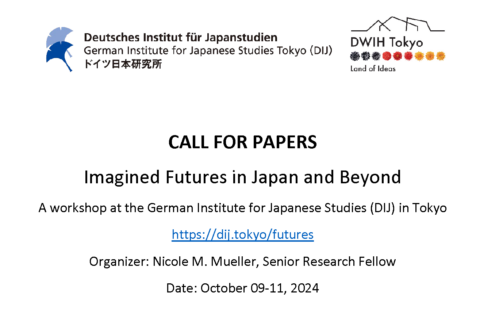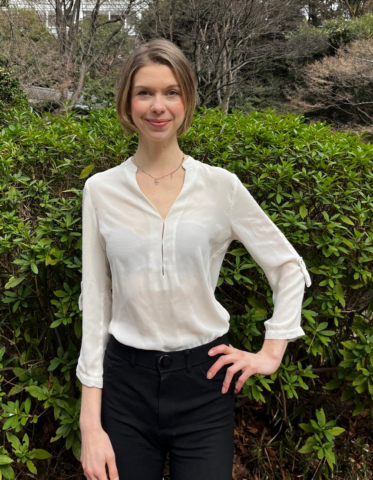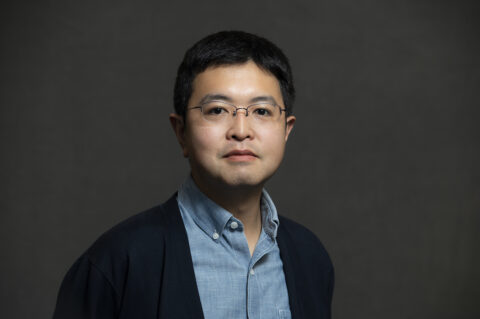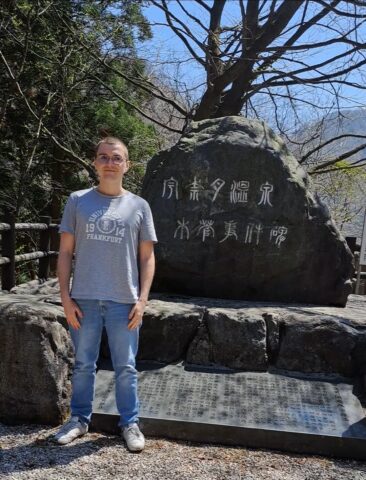Events and Activities
Onsite Study Group on Paradigms of Sociality and Family Engagement among Japanese Men
 The ideologies associated with fatherhood in Japan are changing rapidly in tandem with shifting beliefs about family relationships and work-life balance. While many Japanese fathers aspire to be strong presences in their children’s lives, these men often cannot locate in their own emotionally distant fathers any role models for paternal involvement. What does it mean to be a father in contemporary Japan? How does one learn more about child care, especially when the overwhelming amount of parenting information targets mothers? Can fathers find inspiration outside their families, such as by forming supportive relationships with other parents? This talk will explore how some Japanese fathers are pursuing answers to these questions. It draws upon more than two years of ethnographic fieldwork among parenting-focused groups in the Greater Tokyo Area, and considers what these answers might mean for families, the communities in which they live, and wider society. Details and registration here
The ideologies associated with fatherhood in Japan are changing rapidly in tandem with shifting beliefs about family relationships and work-life balance. While many Japanese fathers aspire to be strong presences in their children’s lives, these men often cannot locate in their own emotionally distant fathers any role models for paternal involvement. What does it mean to be a father in contemporary Japan? How does one learn more about child care, especially when the overwhelming amount of parenting information targets mothers? Can fathers find inspiration outside their families, such as by forming supportive relationships with other parents? This talk will explore how some Japanese fathers are pursuing answers to these questions. It draws upon more than two years of ethnographic fieldwork among parenting-focused groups in the Greater Tokyo Area, and considers what these answers might mean for families, the communities in which they live, and wider society. Details and registration here
Hybrid Study Group on Taiwanese Dissidents and Japan

This talk explores a series of deportations of Taiwanese dissidents from Japan that occurred between 1967 and 1968. The four individuals in question faced the threat of death penalty in Taiwan for political crimes. The presentation demonstrates that these deportations, along with the resistance they sparked, had a profound and lasting impact on both Taiwan and Japan. They played a crucial role in the failure of the Japanese government’s attempts to toughen immigration laws, led to a series of court rulings that eventually established a de facto right to asylum in Japan by 1971, and resulted in the founding of Amnesty International Japan. These events also triggered an ideological shift within the Taiwanese independence movement and led to its ongoing entanglement with the international human rights movement. Details and registration here
POSTPONED Hybrid Study Group on Industrial Policy and Technology Transfer in Postwar Japan

Please note: this session of the DIJ Study Group is postponed until further notice
Was the postwar economic miracle a result of the Japanese government’s industrial policy, or did it occur despite it? Numerous studies on the effects of government policy on industrial growth have produced contradictory or inconclusive findings. In this talk, Krautter argues that one of the main instruments of industrial policy toward growth industries was the licensing system for technology imports. Focusing on technology policy, he finds that the licensing system positively influenced the terms and conditions of technology imports. Krautter contends that the government’s role in postwar industrial development was more that of a coordinator rather than of a “leader” or “guide.” This view is reflected in the description of the Japanese state as a coordination state, contrasting with the well-known concept of the developmental state.
Hybrid Study Group on Attitudes Toward Facial Analysis AI
 Computer vision AI systems present one of the most radical technical transformations of our time. Such systems are given unparalleled epistemic power to impose meaning on visual data despite their inherent ambiguity. This becomes particularly evident in computer vision AI that interprets the meaning of human faces in face recognition or emotion expression systems. Despite scientific, social and political concerns, facial analysis AI systems are widely deployed also in Japan, for example, for training employees to show certain facial expressions. This talk presents findings from a study of public perceptions of facial analysis AI across Argentina, Kenya, Japan, and the USA. It reveals similarities in justification patterns but also significant intra-country and inter-country diversity in response to different facial inferences. The study suggests that there is no “common sense” facial classification that accords with a general, homogeneous “human intuition”. Details and registration here
Computer vision AI systems present one of the most radical technical transformations of our time. Such systems are given unparalleled epistemic power to impose meaning on visual data despite their inherent ambiguity. This becomes particularly evident in computer vision AI that interprets the meaning of human faces in face recognition or emotion expression systems. Despite scientific, social and political concerns, facial analysis AI systems are widely deployed also in Japan, for example, for training employees to show certain facial expressions. This talk presents findings from a study of public perceptions of facial analysis AI across Argentina, Kenya, Japan, and the USA. It reveals similarities in justification patterns but also significant intra-country and inter-country diversity in response to different facial inferences. The study suggests that there is no “common sense” facial classification that accords with a general, homogeneous “human intuition”. Details and registration here
Call for Papers: Workshop ‘Imagined Futures in Japan and Beyond’
 The DIJ, in collaboration with the German Centre for Research and Innovation (DWIH) Tokyo, is hosting an interdisciplinary workshop delving into both fictional and nonfictional portrayals of Japan’s technological future. We will juxtapose these visions with those from other cultures and analyze them through the lens of “narrative” and “sociotechnical imaginary” theoretical frameworks. Scholars whose research aligns with the thematic scope of our workshop are invited to send their abstracts for their planned presentations via E-Mail to mueller@dijtokyo.org by June 15, 2024. We welcome paper proposals by scholars from different career stages (including PhD students) and from a variety of cultural and disciplinary backgrounds. Participants who are accepted for the workshop will be notified by July 5, 2024. Before submitting your abstract, please see the full Call for Papers here
The DIJ, in collaboration with the German Centre for Research and Innovation (DWIH) Tokyo, is hosting an interdisciplinary workshop delving into both fictional and nonfictional portrayals of Japan’s technological future. We will juxtapose these visions with those from other cultures and analyze them through the lens of “narrative” and “sociotechnical imaginary” theoretical frameworks. Scholars whose research aligns with the thematic scope of our workshop are invited to send their abstracts for their planned presentations via E-Mail to mueller@dijtokyo.org by June 15, 2024. We welcome paper proposals by scholars from different career stages (including PhD students) and from a variety of cultural and disciplinary backgrounds. Participants who are accepted for the workshop will be notified by July 5, 2024. Before submitting your abstract, please see the full Call for Papers here
Online Study Group on contemporary Japanese art

Please note: this Study Group session has changed to online only. Western perspectives on Japanese art and artistic practices are often divided into traditional Japanese art movements, such as Nihonga painting, and contemporary art characterized by Pop-Art-like Manga and Anime characters. This presentation examines the fusion of these two worlds by exploring how contemporary Japanese artists utilize traditional Japanese materials and artistic methods commonly associated with Nihonga-art. Focusing on contemporary artists living and working in Kyoto, Alexandra Faust will discuss how these artists integrate traditional Japanese materials and techniques into their artistic practice. Empirical data collected over the last five months not only provides insights into the use of these materials and techniques but also reveals their connection to traditional, often forgotten knowledge about limited natural resources and sustainability. Details and registration here
Hybrid Study Group on Gendered Educational Trajectories
 In Japan, despite women’s improved access to higher education, still only one in five applicants to the nation’s top university are women. This presentation focuses on the role of high school students’ “imagined futures” in the context of highly uncertain admission and diversified higher education to provide explanations for the underrepresentation of women in Japanese selective universities. It draws on data from qualitative interviews with high school seniors and teachers in high schools where almost everyone goes to college. In contrast to the expectation that students in these schools are homogeneous in terms of meritocratic aspirations, this study finds significant gender differences in “aiming high.” This presentation provides theoretical insights into how gendered imagined futures and macro-level contexts combine to allocate men and women with similar academic potential into different educational and occupational trajectories, with implications for inequality in higher education in other sociocultural contexts. Details and registration here
In Japan, despite women’s improved access to higher education, still only one in five applicants to the nation’s top university are women. This presentation focuses on the role of high school students’ “imagined futures” in the context of highly uncertain admission and diversified higher education to provide explanations for the underrepresentation of women in Japanese selective universities. It draws on data from qualitative interviews with high school seniors and teachers in high schools where almost everyone goes to college. In contrast to the expectation that students in these schools are homogeneous in terms of meritocratic aspirations, this study finds significant gender differences in “aiming high.” This presentation provides theoretical insights into how gendered imagined futures and macro-level contexts combine to allocate men and women with similar academic potential into different educational and occupational trajectories, with implications for inequality in higher education in other sociocultural contexts. Details and registration here
Online Study Group on fairness in law in Japan and Germany

When the legal system is abused to merely cause harm to another person or the exercise of the law is grossly contrary to social norms, judges can prohibit the exercise of a legal right. This principle, known as “abuse of rights”, was adopted by Japan from Europe after the Meiji Restoration to resolve conflicts between written law and social norms. This presentation deals with the historical development and contemporary practice of the prohibition of abuse of rights in Japan and Germany. Decisions and the theoretical discussion from the first application in Japan to today will be presented, analyzed, and contrasted with German theory and practice. The aim is to answer the question of how and why the Japanese understanding of the prohibition of abuse of rights differs from that in Germany. This also leads to very fundamental questions about the relationship between legislators and courts, and society’s understanding of law as a whole. Please note that this is an online only event. Details and registration here

















 Open Access
Open Access
